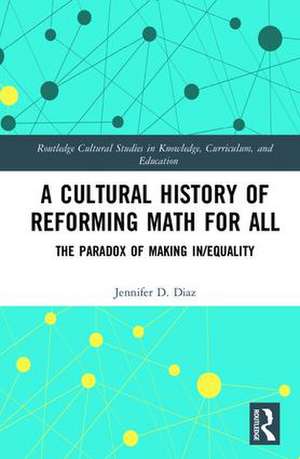A Cultural History of Reforming Math for All: The Paradox of Making In/equality: Routledge Cultural Studies in Knowledge, Curriculum, and Education
Autor Jennifer Diazen Limba Engleză Hardback – 3 oct 2017
| Toate formatele și edițiile | Preț | Express |
|---|---|---|
| Paperback (1) | 376.10 lei 6-8 săpt. | |
| Taylor & Francis – 10 dec 2019 | 376.10 lei 6-8 săpt. | |
| Hardback (1) | 770.09 lei 6-8 săpt. | |
| Taylor & Francis – 3 oct 2017 | 770.09 lei 6-8 săpt. |
Din seria Routledge Cultural Studies in Knowledge, Curriculum, and Education
-
 Preț: 356.18 lei
Preț: 356.18 lei -
 Preț: 393.80 lei
Preț: 393.80 lei -
 Preț: 367.85 lei
Preț: 367.85 lei -
 Preț: 376.10 lei
Preț: 376.10 lei -
 Preț: 377.09 lei
Preț: 377.09 lei - 9%
 Preț: 934.33 lei
Preț: 934.33 lei
Preț: 770.09 lei
Preț vechi: 1030.86 lei
-25% Nou
Puncte Express: 1155
Preț estimativ în valută:
147.36€ • 154.17$ • 122.41£
147.36€ • 154.17$ • 122.41£
Carte tipărită la comandă
Livrare economică 02-16 aprilie
Preluare comenzi: 021 569.72.76
Specificații
ISBN-13: 9781138638402
ISBN-10: 1138638404
Pagini: 134
Dimensiuni: 152 x 229 x 15 mm
Greutate: 0.78 kg
Ediția:1
Editura: Taylor & Francis
Colecția Routledge
Seria Routledge Cultural Studies in Knowledge, Curriculum, and Education
Locul publicării:Oxford, United Kingdom
ISBN-10: 1138638404
Pagini: 134
Dimensiuni: 152 x 229 x 15 mm
Greutate: 0.78 kg
Ediția:1
Editura: Taylor & Francis
Colecția Routledge
Seria Routledge Cultural Studies in Knowledge, Curriculum, and Education
Locul publicării:Oxford, United Kingdom
Public țintă
PostgraduateCuprins
1. Introduction: The Study of School Mathematics is Not About Mathematics 2. The Cultural Politics of School Math: The Problem of In/Equality in the Equal Sign 3. Post War Planning, Reforming Mathematics, and the Cultural (Re)production of Children 4. Creating the Great Society: Making New Math, the Mathematical Citizen, and the Problem of Disadvantage 5. Civil Rights, Fears of Failure, and the Motivation of Basic Skills: Fabricating the Mathematically Dis/abled Individual 6. Planning the 21st Century Future: Standardizing Mathematical Kinds of People to Manage Risk 7. The Alchemy of School Subjects and the Im/Possibilities of Reform
Notă biografică
Jennifer D. Diaz is Assistant Professor of Education at Augsburg University, USA.
Descriere
Building off of a historically conscious understanding of school reform, Diaz makes the case that the language of mathematics, and the symbols through which it is communicated, is not merely about the alleged cultural indifference of mathematical thinking; rather, mathematical teaching relates to historical, cultural, political, and social understandings of equality that order who the child is and should be.
